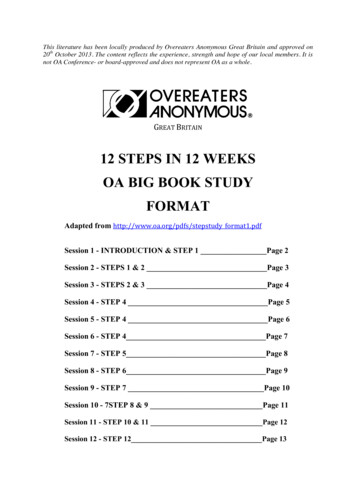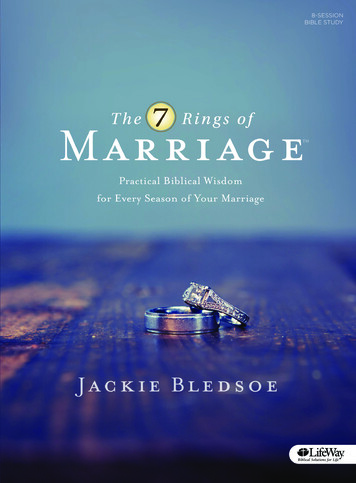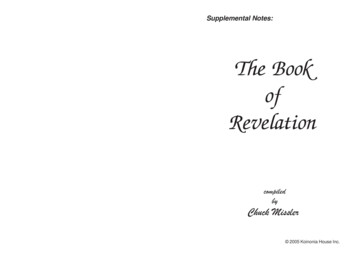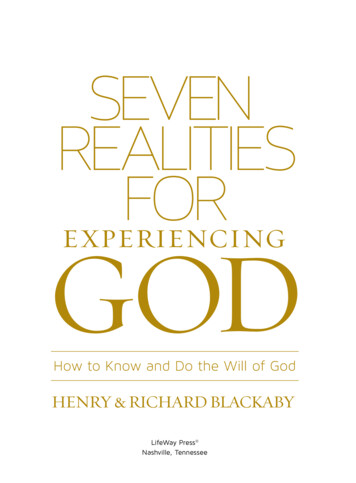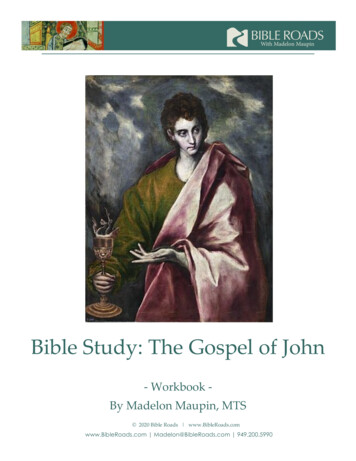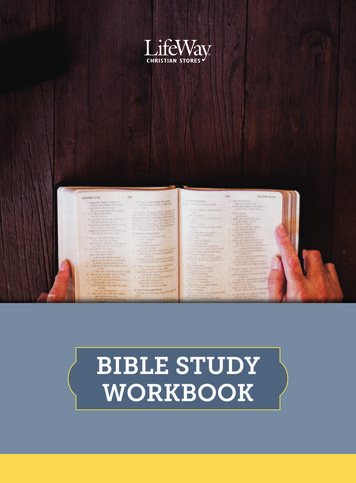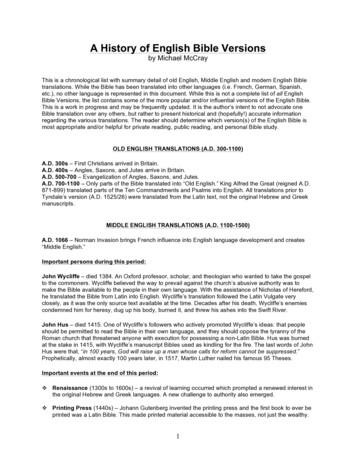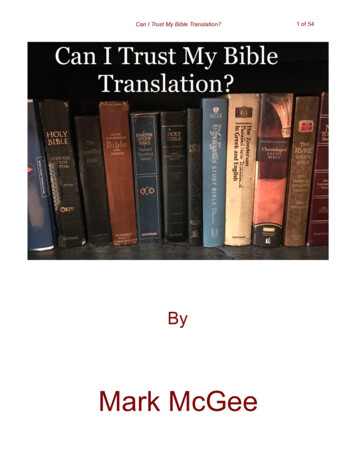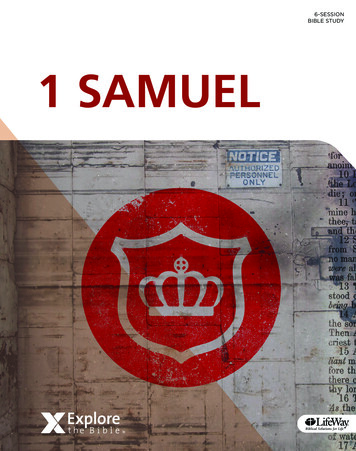
Transcription
6-SESSIONBIBLE STUDY1 SAMUEL
EXPLORE THE BIBLE: 1 Samuel 2016 LifeWay Press ISBN 978-1-4300-4316-4Item 005756888Let the Word dwell in you.Dewey decimal classification: 222.43Subject headings: BIBLE. O.T. 1 SAMUEL / BIBLE. O.T.—HISTORY OF BIBLICAL EVENTS / PROPHETSERIC GEIGERVice President, LifeWay ResourcesMICHAEL KELLYDirector, Groups MinistryERIC GEIGERGeneral EditorJEREMY MAXFIELDContent EditorWith Explore the Bible, groups can expect to engageScripture in its proper context and be better preparedto live it out in their own context. These book-by-bookstudies will help participants—❯❯grow in their love for Scripture;❯❯gain new knowledge about what the Bible teaches;❯❯develop biblical disciplines;❯❯internalize the Word in a way that transformstheir /web/ExploreTheBibleSend questions/comments to: Content Editor, Explorethe Bible: Small-Group Study; One LifeWay Plaza;Nashville, TN 37234-0152.Printed in the United States of AmericaFor ordering or inquiries visit www.lifeway.com; writeto LifeWay Small Groups; One LifeWay Plaza; Nashville,TN 37234-0152; or call toll free 800.458.2772.We believe that the Bible has God for its author;salvation for its end; and truth, without any mixtureof error, for its matter and that all Scripture istotally true and trustworthy. To review LifeWay’sdoctrinal guideline, please visit www.lifeway.com/doctrinalguideline.Scripture quotations are taken from the HolmanChristian Standard Bible , Copyright 1999, 2000,2002, 2003, 2009 by Holman Bible Publishers . Used bypermission. Holman Christian Standard Bible , HolmanCSB , and HCSB are federally registered trademarks ofHolman Bible Publishers.Session 1 quotation: Martin Luther, as quoted in E. M.Bounds, Purpose in Prayer [online, cited 14 January2016]. Available from the Internet: www.ccel.org.Session 2 quotation: Charles Spurgeon, as quoted inErnest W. Bacon, Spurgeon: Heir of the Puritans (ArlingtonHeights, IL: Christian Liberty Press, 1967), 115. Session 3quotation: C. S. Lewis, The Weight of Glory (New York:HarperCollins, 2001), 26. Session 4 quotation: J. R. R.Tolkien, The Lord of the Rings, vol. 1, The Fellowship ofthe Ring (Boston: Houghton Mifflin Harcourt, 1966).Session 5 quotation: Mark Twain, BrainyQuote [online,cited 25 January 2016]. Available from the Internet:www.brainyquote.com. Session 6 quotation: JackieRobinson, as quoted in Mark Newman, “1947: A Timefor Change,” MLB News [online], 13 April 2007 [cited14 January 2016]. Available from the Internet: http://m.mlb.com/news/article/1895445/.1
ABOUT THIS STUDYThe Bible is an amazing gift from our awesome God. In it He reveals Himself and His glory for usto witness. I’m excited that you’re joining this journey through the Book of 1 Samuel. It’s truly epicand beautiful in its scope and message.In 1 Samuel we see the story of God’s people. As we do, we see the greatness of our God over Hispeople. He’s worthy. He’s holy. He’s the God above all gods, the King above all kings. As your groupdiscusses this book, I want to encourage you to see the overarching theme of God’s greatness as theumbrella that encompasses each story.So many times life takes its toll on us, and we’re prone to take our eyes off God and His great sufficiencyfor us. Therefore, your discussions and emphasis on God’s greatness and the victories He wins for Hispeople will be a great reminder and encouragement. In 1 Samuel God’s greatness will be a constantbackground as you discuss stories of deliverance, victory, forgiveness, and worship.As you study the passages in their context and seek to obey them in your context, I know the Lordwill encourage you and challenge you. Enjoy the journey through 1 Samuel. Our God is still great,still cares for His people, and is still the King above all kings.The Explore the Bible series will help you know and apply the encouraging and empowering truthof God’s Word. Each session is organized in the following way.UNDERSTAND THE CONTEXT: This page explains the original context of each passage and beginsrelating the primary themes to your life today.EXPLORE THE TEXT: These pages walk you through Scripture, providing helpful commentaryand encouraging thoughtful interaction with God through His Word.OBEY THE TEXT: This page helps you apply the truths you’ve explored. It’s not enough to know whatthe Bible says. God’s Word has the power to change your life.LEADER GUIDE: This final section provides optional discussion starters and suggested questionsto help anyone lead a group in reviewing each section of the personal study.For helps on how to use Explore the Bible, tips on how tobetter lead groups, or additional ideas for leading, visit:www.ministrygrid.com/web/ExploreTheBible.2E X PL OR E T H E B I BL E
GROUP COMMITMENTAs you begin this study, it’s important that everyone agrees to key group values. Clearly establishingthe purpose of your time together will foster healthy expectations and help ease any uncertainties.The goal is to ensure that everyone has a positive experience leading to spiritual growth and truecommunity. Initial each value as you discuss the following with your group. PRIORITYLife is busy, but we value this time with one another and with God’s Word. We choose to makebeing together a priority. PARTICIPATIONWe’re a group. Everyone is encouraged to participate. No one dominates. RESPECTEveryone is given the right to his or her own opinions. All questions are encouraged and respected. TRUSTEach person humbly seeks truth through time in prayer and in the Bible. We trust Godas the loving authority in our lives. CONFIDENTIALITYAnything said in our meetings is never repeated outside the group without the permissionof everyone involved. This commitment is vital in creating an environment of trust andopenness. SUPPORTEveryone can count on anyone in this group. Permission is given to call on one anotherat any time, especially in times of crisis. The group provides care for every member. ACCOUNTABILITYWe agree to let the members of our group hold us accountable to commitments we make inthe loving ways we decide on. Questions are always welcome. Unsolicited advice, however,isn’t permitted.I agree to all the commitments.Date3
GENERAL EDITOR Eric Geiger serves as the vice president of the ResourcesDivision at LifeWay Christian Resources. Eric received hisdoctorate in leadership and church ministry from the SouthernBaptist Theological Seminary. He has authored and coauthoredseveral books, including Creature of the Word and the best-sellingchurch-leadership book Simple Church.Eric also serves as the senior pastor of ClearView Baptist Church in Franklin,Tennessee. Eric is married to Kaye, and they have two daughters, Eden and Evie.4E X PL OR E T H E B I BL E
CONTENTSSession 1Answered (1 Samuel 1:10-18,26-28) 6Session 2King (1 Samuel 8:4-9,19-22) 16Session 3Judged (1 Samuel 15:7-15,22-23) 26Session 4Anointed (1 Samuel 16:4-13) 36Session 5Delivered (1 Samuel 17:32-37,42-50) 46Session 6Respect (1 Samuel 26:7-12,21-25) 56Leader Guide 66Tips for Leading a Group 78 5
SESSION 1AnsweredGod answers the prayers of those who humbly seek Him.6E X PL OR E T H E B I BL E
ABOUT 1 SAMUELAUTHORThe human writer of 1 Samuel isn’t mentioned in Scripture, though itbears the name of the prophet who was the bridge between the timeof the judges and the beginning of the monarchy in Israel. AlthoughJewish tradition attributes the book to Samuel himself, this isunlikely because the events described extended past the life of theprophet. First Chronicles 29:29-30, however, mentions a historicalcollection that appears to have been written by Samuel, so it’s safe toassume that the writer of 1 Samuel used this resource and possiblythe writings of the prophets Nathan and Gad.DATETwo questions emerge in any discussion about the chronologyof 1 Samuel. First, at what time did the events in the book occur?It’s fairly certain that they took place from 1105 to 1010 B.C.Second, when were the events of 1 Samuel actually written in thehistorical narrative we know today? Most conservative scholarsbelieve the book was written sometime either during King Solomon’sreign (around 950 B.C.) or perhaps after the kingdom divided in931 B.C. The reference to the kings of Judah in 1 Samuel 27:6 couldpossibly indicate the latter date.PURPOSE“ I HAVE SO MUCH TO DOTHAT I SHALL SPENDTHE FIRST THREEHOURS IN PRAYER.”—Martin LutherFirst and Second Samuel were originally one document in the HebrewBible. This fact no doubt informs any attempt to understand thewriter’s purpose. Both books provide accounts of the emergence ofkingship and the history of the kingdom of God in Israel. The narrativeis built around three major characters: Samuel, Saul, and David.A study of 1 Samuel will reveal the primacy of God’s glory. While thelives of some characters (Samuel and David) reflected His greatnessand goodness, others (Eli, his sons, and Saul) made a mockeryof God and defamed Him by their actions. These lessons will lead usto confront the call to exalt God alone.S e s s i o n 1: A n s we re d7
1 SAMUEL 1:10-18,26-2810 Deeply hurt, Hannah prayed to the Lord and wept with manytears. 11 Making a vow, she pleaded, “Lord of Hosts, if You willThink About ItNote all of Hannah’sself-descriptors in thisBible passage.How did she define herselfin relation to Eli the priest?In verses 10-16 identifythe emotions Hannahexperienced.take notice of Your servant’s affliction, remember and not forgetme, and give Your servant a son, I will give him to the Lord allthe days of his life, and his hair will never be cut.” 12 While shecontinued praying in the Lord’s presence, Eli watched her lips.13 Hannah was praying silently, and though her lips were moving,her voice could not be heard. Eli thought she was drunk 14 andscolded her, “How long are you going to be drunk? Get rid of yourwine!” 15 “No, my lord,” Hannah replied. “I am a woman with abroken heart. I haven’t had any wine or beer; I’ve been pouringout my heart before the Lord. 16 Don’t think of me as a wickedwoman; I’ve been praying from the depth of my anguish andresentment.” 17 Eli responded, “Go in peace, and may the Godof Israel grant the petition you’ve requested from Him.” 18 “Mayyour servant find favor with you,” she replied. Then Hannah wenton her way; she ate and no longer looked despondent.26 “Please, my lord,” she said, “as sure as you live, my lord, I am thewoman who stood here beside you praying to the Lord. 27 I prayedfor this boy, and since the Lord gave me what I asked Him for,28 I now give the boy to the Lord. For as long as he lives, he isgiven to the Lord.” Then he bowed in worship to the Lord there.8E X PL OR E T H E B I BL E
UNDERSTAND THE CONTEXTUSE THE FOLLOWING PAGES TO PREPARE FOR YOUR GROUP TIME.Change was in the air during the time of the events recordedin 1 Samuel. The priesthood had grown corrupt. Neither Eli nor hissons, Hophni and Phinehas, served the Lord in a way that honoredHim. God, therefore, would bring an end to Eli’s priestly dynasty (see1 Sam. 2:12-36). It also was a time of transition in government from atheocracy (the rule of God) to a monarchy (the rule of a king). Samuel,the child born through God’s intervention, would be a stabilizingforce during these days of upheaval and transition. Samuel wouldanoint the first two kings of Israel but to different outcomes. The firstking, Saul, proved unfit for the office. Therefore, God would call outthe young shepherd David to lead His people.It would be a mistake to assume that everything in Israel rose and fellbecause of the people in positions of power. In the opening chapter ofthe book, we meet an ordinary woman in great distress who prayedto God. Hannah played a key role in the unfolding of God’s plan andpurpose for Israel. She was one of two wives of Elkanah, a man ofthe tribe of Ephraim, and she was unable to have a child. This is atraumatic situation in any era or culture but especially so in ancientIsrael, where children were viewed as evidence of God’s blessing andfavor. Hannah prayed for a child, and God heard and answered her.The child born to Hannah was Samuel. In gratitude Hannah gavethe child back to the Lord because she loved the Giver more thanthe gift. Her prayer in 1 Samuel 2:1-10 is a triumphant celebrationof the power of God to overturn human designs and anticipates theemergence of kings in Israel (see v. 10).S e s s i o n 1: A n s we re d9
EXPLORE THE TEXTHANNAH’S PRAYER (1 Samuel 1:10-11)Deeply hurt, Hannah prayed to the Lord and wept with many tears.Making a vow, she pleaded, “Lord of Hosts, if You will take notice of Yourservant’s affliction, remember and not forget me, and give Your servant ason, I will give him to the Lord all the days of his life, and his hair will neverbe cut.”1011As a part of their normal practice, Hannah and her husband, Elkanah, wentto Shiloh, the place of worship in Israel, to offer a sacrifice to the Lord. With thetaunts of her rival, Peninnah (Elkanah’s other wife), about her barrenness ringingin her ears (see vv. 6-7), Hannah went to the Lord’s tabernacle, where Eli the priestwas serving. A literal description of the state of Hannah’s heart in verse 10 is “bitterof soul.” The phrase is repeated in 22:2 to describe those who, because of desperationin their lives, rallied around David as king. The purest prayer comes from desperatedevotion and a believing heart that can find relief and help only from God. In Hiscompassion the Father takes notice of all our grief and sorrow.Why is it important to be honest with God about our pains and frustrations?As Hannah prayed, she made a vow to the Lord. This raises the question of whetherit’s advisable to promise God to do a certain thing in response to His answeringa prayer. Our relationship with God is based on grace. We can’t earn His favor or10E X PL OR E T H E B I BL E
benefits. In Hannah we see the heart attitude to which God favorablyresponds. In the original language she called herself a servant orslave to the Lord. A deep understanding of the Lord’s greatness andof our position in relation to Him drives and motivates prayer. Thus,prayer isn’t a means to secure what we want for ourselves but rathera submission of everything in our lives to His control.In asking the Lord to remember her, Hannah wasn’t seekingto jog the memory of God. Rather, she was asking Him to act in herbehalf. In return, Hannah’s promise to God was that her son wouldbe a lifelong Nazirite (see Num. 6:1-7). Unlike the Levitical priests,who served from age 25 to 50 (see 8:23-26), this boy would foreverbe in the service of the Lord.KEY DOCTRINEStewardshipChristians shouldrecognize their time,talents, and materialpossessions as entrustedto them to use for theglory of God and forhelping others.What role does submission play in prayer? How are humilityand submission to God related?ELI’S AFFIRMATION (1 Samuel 1:12-18)While she continued praying in the Lord’s presence, Eliwatched her lips. 13Hannah was praying silently, and thoughher lips were moving, her voice could not be heard. Eli thoughtshe was drunk 14and scolded her, “How long are you going to bedrunk? Get rid of your wine!”12Though Eli was likely past the age of service for serving as a priest,he was monitoring activity in the tabernacle (see v. 9). As he observedHannah’s praying, he mistook fervency in whispered prayer assomething irreverent and concluded that she was intoxicated. Perhapsthe type of praying demonstrated by Hannah was uncharacteristicof that time, and Eli wasn’t accustomed to seeing prayer practiced thatway. Eli accused Hannah of being drunk and scolded her to sober up.Perhaps he’d witnessed such abuses in the tabernacle in the past,but he completely misread this woman. He could watch her lips,but he couldn’t see into her heart.“No, my lord,” Hannah replied. “I am a woman with a brokenheart. I haven’t had any wine or beer; I’ve been pouring out myheart before the Lord. 16Don’t think of me as a wicked woman; I’vebeen praying from the depth of my anguish and resentment.”15S e s s i o n 1: A n s we re d11
BIBLE SKILLCompare passageswith related themes.Compare 1 Samuel 2:1-10and Luke 1:46-55.At what points are the twosongs similar?How are they different?What conclusions canbe drawn about Godfrom these two songs?Hannah replied to this rebuke with humility. She was even willingto subject herself to a priest whose discernment could be questioned.Perhaps the greatest test of our servanthood comes in ourrelationships with others. Serving the Lord is one thing, but beingwilling to humble ourselves before other people is something else.Eli responded, “Go in peace, and may the God of Israel grant thepetition you’ve requested from Him.” 18“May your servant findfavor with you,” she replied. Then Hannah went on her way; sheate and no longer looked despondent.17Eli realized that he had misread Hannah. He blessed and encouragedher with a priestly benediction after recognizing God was at workin that moment. The point isn’t that our prayers should impressothers to the point that we receive validation from them. We shouldpray sincerely and trust that God will affirm our petitions, whetherthrough human encouragement or inner confirmation by the HolySpirit based on His Word.Hannah’s response to Eli again revealed her humility. The wordtranslated favor (see v. 18) also can mean grace (KJV) and describesundeserved favor. With respect to God, grace is His unmerited favorthat He extends to sinners when they repent and believe in His Son,Jesus Christ (see Eph. 2:8-9).Notice the difference in Hannah’s attitude and demeanor as she leftthe place of prayer. Though her circumstances hadn’t changed, afterprayer she was transformed. Prayer does that for us as well. Whenwe get up off our knees, confident that God has heard us and will actaccording to His will, we can reengage life with a new attitude.On what basis can we know that God has heard our prayer?What promises can we claim from Scripture?HANNAH’S PRESENTATION(1 Samuel 1:26-28)“Please, my lord,” she said, “as sure as you live, my lord, I amthe woman who stood here beside you praying to the Lord.”2612E X PL OR E T H E B I BL E
After her encounter with Eli in the tabernacle, Hannah went hometo Ramah with her husband. God answered her prayer, and she borea son whom she named Samuel, which meant name of God. His nameindicated the divine intervention that came through his mother’sprayer (see vv. 19-20). After Samuel was weaned (usually around age3), Hannah took the child to the annual sacrifice to dedicate Samuelto the Lord permanently (see vv. 21-22). Elkanah had the prerogativeunder the law to overrule her vow (see Num. 30:10-15), but he didnot do so. Instead, Elkanah affirmed her plan, no doubt indicatinghis own devotion to the Lord (see 1 Sam. 1:23). Hannah remindedEli of their previous encounter in which she prayed to the Lord whilestanding beside him, lost in communion with God.“I prayed for this boy, and since the Lord gave me whatI asked Him for, 28I now give the boy to the Lord. For as longas he lives, he is given to the Lord.” Then he bowed in worshipto the Lord there.27God gave Hannah a child, and she gave the child back to God. Thoughshe would later bear other children with God’s help (see 2:21), Samuelwould remain at the tabernacle in service to the Lord. Only thosewho know the Lord through meaningful prayer attain to the deepestcommitments.How does seeing an answered prayer encourage the personwho prayed? How does it encourage others who were awareof the prayer?
OBEY THE TEXTWe can approach God with our frustrations and heartfelt desires, knowing we can trust Himto do what’s best. We encourage others by praying with them in agreement, sympathizing withtheir heartaches. God is praised when we recognize that all we have and are come from Him.Describe your greatest disappointment in life at this moment. Take time to pray about thisissue, following the example set by Hannah.Discuss with the group how prayer with others can be a source of encouragement. Identifyactions the group can take this week to encourage one another through prayer. Recordprayer needs and put into practice the actions identified.List ways God has answered your prayers in the past. With whom can you share this listas an act of worship and thanksgiving to God?MEMORIZE“ Hannah prayed: My heart rejoices in theLORD; my horn is lifted up by the LORD.My mouth boasts over my enemies,because I rejoice in Your salvation.”1 Samuel 2:114E X PL OR E T H E B I BL E
USE THE SPACE PROVIDED TO MAKE OBSERVATIONS AND RECORD PRAYERREQUESTS DURING THE GROUP EXPERIENCE FOR THIS SESSION.MY THOUGHTSRecord insights and questions from the group experience.MY RESPONSENote specific ways you’ll put into practice the truth explored this week.MY PRAYERSList specific prayer needs and answers to remember this week.S e s s i o n 1: A n s we re d15
LEADER GUIDE—SESSION1GETTING STARTEDOPENING OPTIONS: Choose one of the following to open the group discussion.WEEKLY QUOTATION DISCUSSION STARTER: “I have so much to do that I shall spend the first threehours in prayer.”—Martin Luther❯❯What’s your initial response to this week’s quotation?❯❯What steps do you take to bring order to your day and to identify priorities?❯❯Today we’ll see that making prayer a priority enables us to focus on God’s ability to accomplishwhat’s beyond our own abilities.CREATIVE ACTIVITY: Before the group meets, get a three-pack can of tennis balls. With all the ballsin the can, carefully pour uncooked rice into the can, filling the space between the tennis balls until thecan is full. Then pour the rice back into a separate container. When the group arrives, use the followingdemonstration and questions.❯❯This empty can represents the amount of time we have. The tennis balls represent prioritieslike worship, community, and prayer. The rice represents our other obligations and activities.❯❯Ask people to provide examples of typical activities in their lives, such as work, family, andexercise. Pour rice into the empty can with each answer until all the rice is in the can.❯❯Place the three tennis balls on top of the rice, revealing that they won’t all fit and that somethingimportant will be left out.❯❯Remove everything from the can and then place the tennis balls in the empty can first.Now pour the rice into the can, revealing that everything now fits into the same space.❯❯Today we’ll see that prioritizing prayer, worship, and godly community allows us to see Goddo things that are otherwise impossible.UNDERSTAND THE CONTEXTPROVIDE BACKGROUND: Briefly introduce members to 1 Samuel, pointing out the major themes andany information that will help them understand 1 Samuel 1:10-18,26-28 (see pp. 7 and 9). Then, to helppeople personally connect today’s context with the original context, use the following questions andstatements.66❯❯About what kinds of things do you most often pray?❯❯Why is prayer vital to a person’s relationship with God?❯❯The Book of 1 Samuel opens with the prayers of a woman named Hannah.E X PL OR E T H E B I BL E
EXPLORE THE TEXTREAD THE BIBLE: Ask two volunteers to read 1 Samuel 1:10-18,26-28.DISCUSS: Use the following questions to discuss group members’ initial reactions to the text.❯❯Why might it be significant that the Book of 1 Samuel opens with a story of prayer and provision?❯❯How does the text describe Hannah’s emotions? What does this passage reveal about emotionalhonesty in our spiritual lives?❯❯How does specific prayer function in this story? Godly counsel? Worship?❯❯How did Eli respond before understanding the situation? After understanding?After God answered?❯❯What can we conclude from the change in Hannah’s behavior after her prayer but beforeGod’s answer?❯❯What else does this text teach us about God? Ourselves?❯❯What other questions or observations do you have?NOTE: Provide ample time for group members to share responses and questions about the text. Don’tfeel pressured to prioritize the printed agenda over group members’ personal experiences. If timeallows, discuss responses to the questions in the personal reading.OBEY THE TEXTRESPOND: Foster an environment of openness and action. Help individuals apply biblical truthto specific areas of personal thought, attitude, and/or behavior.❯❯Are you ever afraid to make specific requests in prayer? Why or why not?❯❯Who can share a story of God’s answering a specific prayer immediately or over time?❯❯How do today’s study and the stories just shared encourage you?❯❯What will you do to start prioritizing prayer as a regular part of your week?❯❯How can we pray for one another now and throughout the week?PRAY: Close by praying for group members to desire and rely on daily time in prayer. Ask God to workon behalf of any requests shared. Thank God that He hears us and answers our prayers in His timing.L eader Guide—S ession 167
writer’s purpose. Both books provide accounts of the emergence of kingship and the history of the kingdom of God in Israel. The narrative is built around three major characters: Samuel, Saul, and David. A study of 1 Samuel will reveal the primacy of God’s glory. While the lives of s



